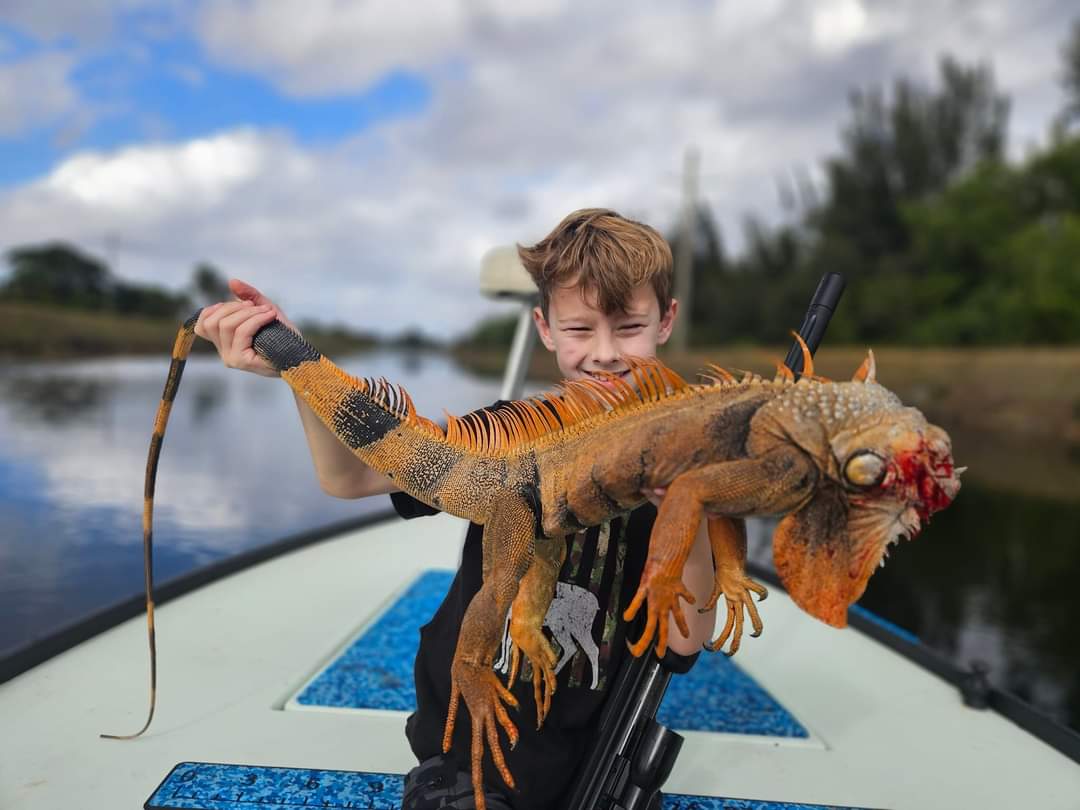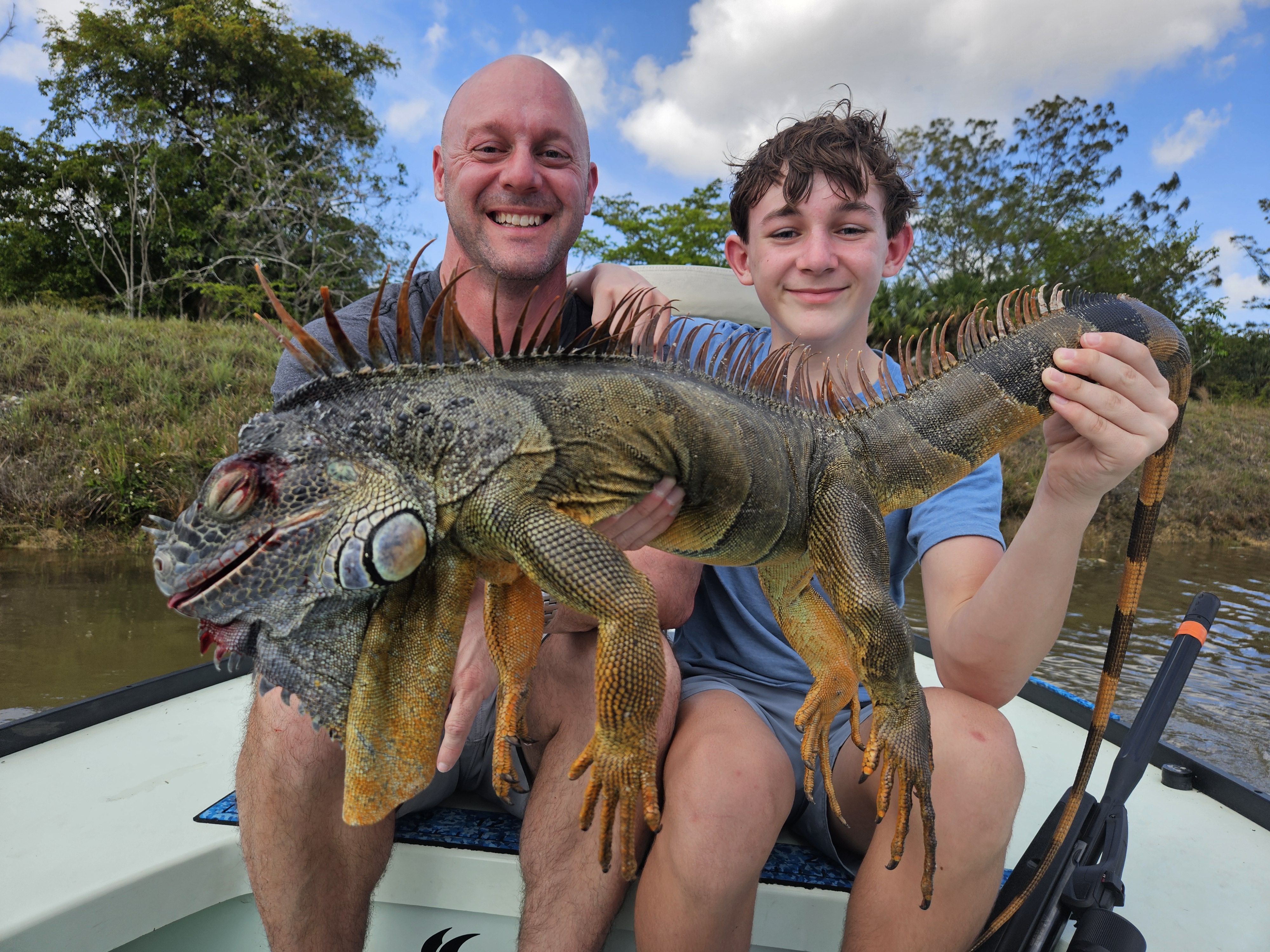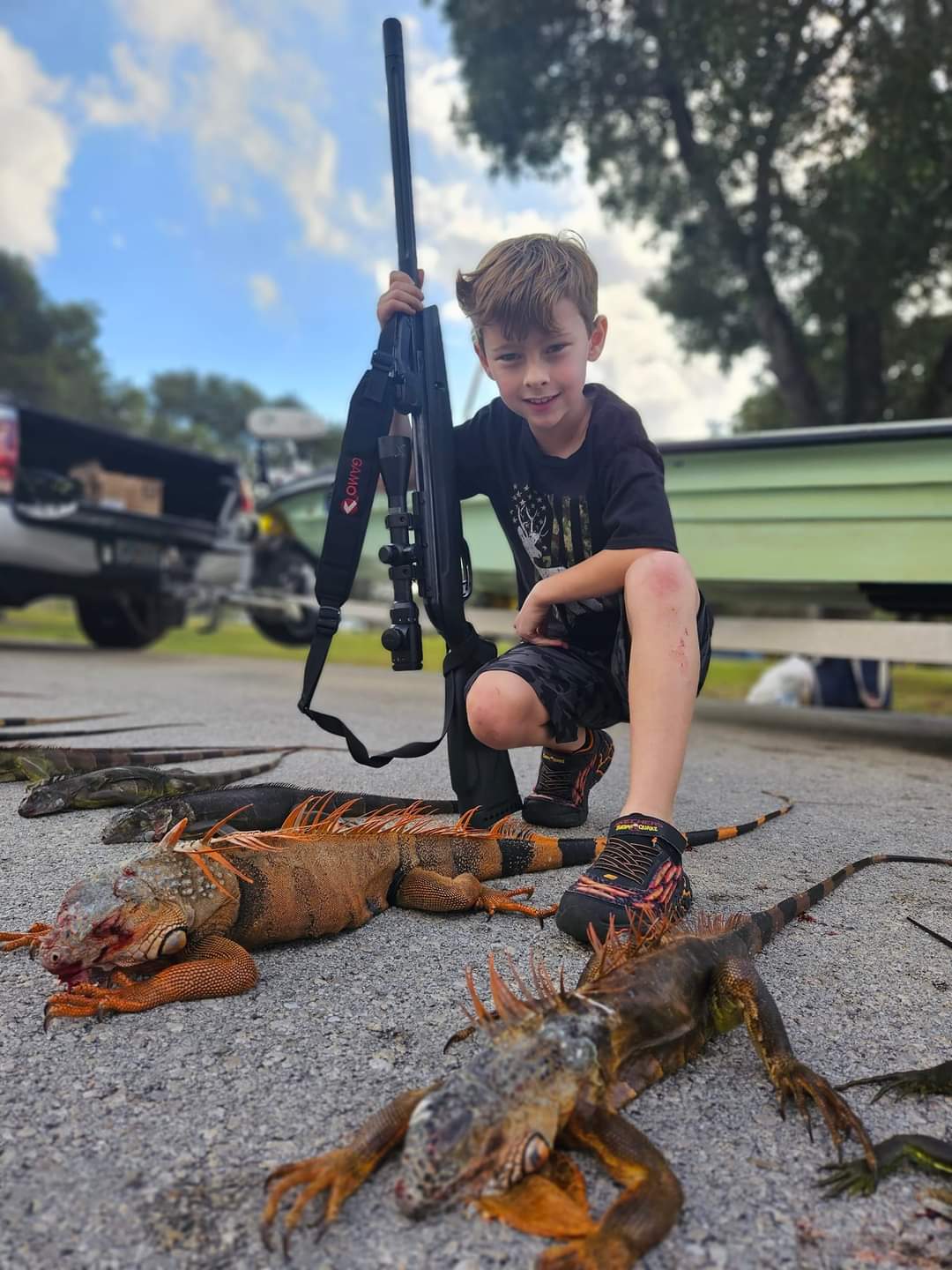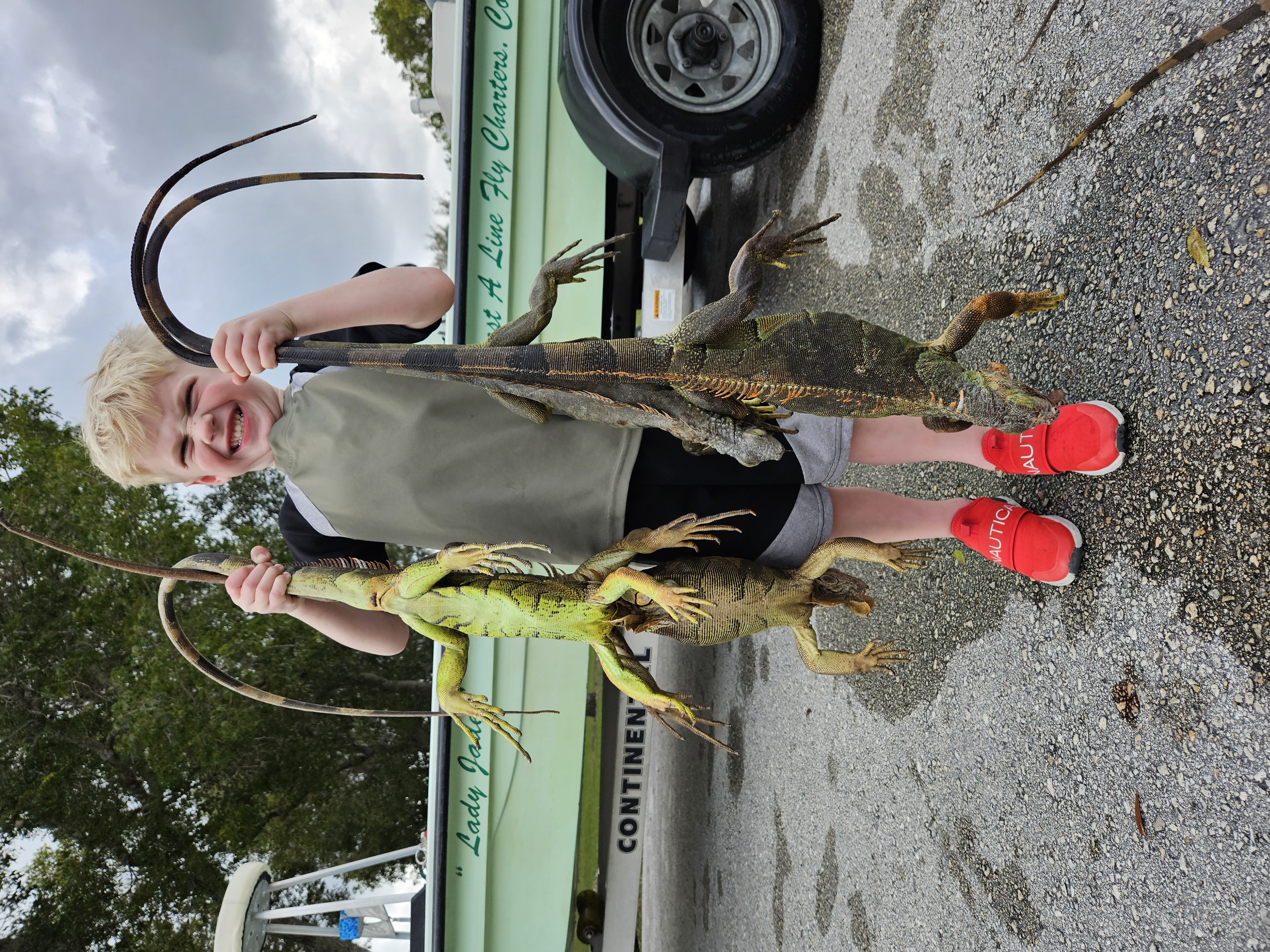Cast & Blast| Snakehead and Iguana| Fly Fishing & Light Tackle Spin| Air riffles.
Sunrise, FL
1-3 Hunters • No Lodging • Public • Guided
Description
8-Hour Cast & Blast: 4-Hours Snakehead / 4-Hours Iguana Hunting
Up to 2 Anglers Included | Add 1 More for Additional Fee
Come cast a line with us in the beautiful Urban Jungle of South Florida, and enjoy the breathtaking sceneries of the magnificent Everglades.
The Everglades is a place like nowhere else on Earth with millions of acres, thousands of islands full of mangroves, and hundreds of miles of shoreline running along the Gulf of Mexico. It is for sure one of the World's best fisheries, and one of the greatest flats fishing destinations on the planet. While having fun fishing, you can also enjoy a nice ride on the Lady Jade. Sit back, relax, and feast your eyes with the most amazing, and breathtaking scenery. You'll likely encounter a number of wildlife such as Dolphins, Sharks, Manatees, Crocodiles, Alligators, and well over 300 species of birds.
Florida's Everglades is the only place on Earth where both Crocodiles, and Alligators coexist.
SNAKEHEAD FISHING
Bullseye Snakehead AKA " The Urban Jungle Dragon ". A native of Thailand. It's one of 50-plus species of Snakehead in the World. In the U.S., it can only be found here in South Florida. Come test your skills, and experience the sickest topwater blowup! Violence headshakes, dazzling runs, and the powerful tug of this great Beast.
Do you have what it takes to tame the Dragon?
IGUANA HUNTING
Green Iguanas are not native to Florida and are considered invasive species due to their impacts to native wildlife.
The Green Iguana is native to South & Central America, Mexico, and some islands of the Caribbean but, once again, because of the popularity of the iguana in the pet trade, they have become invasive in South Florida, Hawaii, Texas, and Puerto Rico.
Iguanas are a big problem in Florida as they cause damage to commercial and residential landscape vegetation. Most property owners consider these reptiles as a nuisance. These animals are mostly attracted to plants with flowers, foliage, or any kind of vegetables, and they destroy them.
How They Got Here - Florida's first green Iguanas likely hitched a ride on Cuban cargo ships transporting goods to Florida. Soon after their arrival, the herbivorous lizards reproduced rapidly and established themselves throughout South and Central Florida.
Can you Eat them and What Does it Taste Like - Iguanas are referred to as the "chicken of the trees," by iguana eaters, because they are said to taste " like chicken ". Many people enjoy the meat from iguanas because of the high levels of protein it provides. In fact, iguana is a pretty lean meat and contains more protein than chicken.
It's a common delicacy in Mexico, Central and South America — and in trendy U.S. restaurants that cater to anyone craving a lizard entree. Iguana gourmets in the U.S. are sometimes immigrants from other countries looking for a taste of home.
Why do People Hunt Iguanas - They are invasive and they cause damage to seawalls, sidewalks, and landscape foliage and can dig lengthy tunnels causing millions in damages to residents and businesses. Also, they prey on the vulnerable native Burrowing owls by eating their eggs and driving them out of their homes. Non-native iguanas are multiplying so rapidly in South Florida that a state wildlife agency is now encouraging people to kill them.
Book your ultimate hunt adventure! Enjoy and have fun while helping to remove South Florida invasive species.
Base price is for a Full-Day Charter for 1-2 Anglers. A third Angler can be added for an additional fee.
Live bait is not included, but available at market price of $10 per dozen.
Gratuity is always appreciated!
The Captain can accommodate up to 3 anglers per trip.
However, if there are more than 3 anglers, please advise your Captain before booking. So we can see and try to arrange additional boat for your group.
Local lodging/hotel accommodation recommendations can be provided and we can pick you up from the closest launch.
Other Florida Species Include
Midas Cichlid - Amphilophus citrinellus is a large cichlid fish endemic to the San Juan River and adjacent watersheds in Costa Rica and Nicaragua. In the aquarium trade a citrinellus is often sold under the trade name of Midas cichlid.
Jaguar Quapote Cichlid - Parachromis Managuensis is a large species of cichlid native to freshwater habitats in Central America, where found from Honduras to Costa Rica. The scientific name refers to Lake Managua in Nicaragua from where the holotype was obtained.
Mayan Cichlid - Mayaheros urophthalmus, also known as the Mayan cichlid or Mexican mojarra is a species of cichlid.
Tigar Oscar - The oscar is a species of fish from the cichlid family known under a variety of common names, including tiger oscar, velvet cichlid, and marble cichlid. In tropical South America, where the species naturally resides, A. ocellatus specimens are often found for sale as a food fish in the local markets.
Bowfin - The bowfin is a bony fish, native to North America. Common names include mudfish, mud pike, dogfish, griddle, grinnel, swamp trout, and choupique. It is regarded a relict, being the sole surviving species of the Halecomorphi, a group of fish that first appeared during the Early Triassic, around 250 million years ago.
Bullseye Snakehead - Channa marulius is a large species of snakehead native to South Asia. Populations in Southeast Asia are now regarded as separate species.
Clownknife - The clown featherback, clown knifefish, or spotted knifefish, Chita a ornata, is a nocturnal tropical fish with a long, knife-like body. This knifefish is native to freshwater habitats in Cambodia, Laos, Thailand, and Vietnam, but it has also been introduced to regions outside its native range.
Spotted Tilapia - The spotted tilapia, also known as the spotted mangrove cichlid or black mangrove cichlid, is a species of fish of the cichlid family. It is native to fresh and brackish water in West and Central Africa, but has been introduced to other regions where it is considered invasive.
Salvini Cichlid - The Salvin's cichlid, also known as the yellow-belly cichlid or tricolored cichlid, is a species of the family Cichlidae. It is found in rivers of the Atlantic slope of southern Mexico, Belize, and Guatemala.
Blue Tilapia - The blue tilapia is a species of tilapia, a fish in the family Cichlidae. Native to Northern and Western Africa, and the Middle East, through introductions it is now also established elsewhere, including parts of the United States, where it has been declared an invasive species, and has caused significant environmental damages. It is known as Blue kurper in South Africa.
Show More
Upgrades
3rd Angler
$110.00
Your Outfitter
Justin N
Come cast a line with us in the beautiful Urban Jungle of South Florida, and enjoy breathtaking scenery of the magnificent Everglades.
Location
Gear List
- Polarized Glasses
- Hat/Cap
- Buff
- Sunscreen (NON SPRAY! It will stain the boat)
Show More
Rules & Guidelines
*DO NOT Bring bananas on board! Otherwise you'll be thrown to the gators and shards!
Shoes: Wear soft-soled shoes with light-colored soles. White-soled tennis shoes are great. DO NOT wear black soles or leather soles shoes,they will leave hard-to-clean marks on the boat.
THINGS TO REMEMBER TO MAKE YOUR CAPTAIN HAPPY!
DO NOT step on the seat cushion!
DO NOT walk around the boat unless the Captain asks you to!
LAUNCHING TIMES AND LOCATIONS.
Trip starts at the arranged time between you and the Captain.
Normal launching time is 7AM - 7:30AM from several different locations, depending on the charter that you booked, and the fishing conditions. The Captain will keep you updated and will let you know of which location to launch from closer to date of the trip.
So make sure you get enough rest, and don't be late! The Captain is not responsible for lost time.
Also, if you can avoid eating/drinking too much, and make sure to use the restroom before the charter!
FLY ANGLERS
Practice your casting, work on your double hauls. It wlll save time, and it will make things much easier for you and your Captain. Also, you'll have a better chance with more success.
LISTEN TO YOUR GUIDE
Casting, and making that perfect presentation is very important! Especially when it comes to sight fishing. It's always good to listen to your Captain. So if he tells you to cast at 10 o'clock, don't go and cast at 2 o'clock. Don't be that guy!
PHOTOS / VIDEOS
Your Captain will be taking many great photos, and some videos during the trip, which can be sent via text or email to you, so you can share them to your friends and family.
WHAT TO EXPECT FROM YOUR TRIP
A fun and memorable fishing adventure with your friends/family. An escape from the everyday, a day of learning and sharing knowledge. Your Captain will do his best to make sure you'll have a great time, and to have a successful day together.
Remember.... Fish is just a bonus!
Show More




